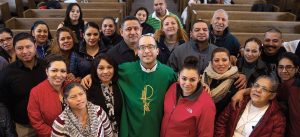After Yoni Chavez’s father was murdered in Mexico, his wife and mother encouraged him to go on a Koinonia retreat. But he thought he was doing “just fine” in his life.
“I didn’t want to go. My wife and my mom told me to go because it changed their lives but I wasn’t ready,” he said.
He had signed up to attend a few times and, each time, he changed his mind and stayed home.
“I thought that I was OK before I went to Koinonia. But I started feeling a lot of hate on my heart,” he recalled.
Eventually, Chavez attended one of the retreats.
“After I went to Koinonia, God healed me. It changed my life and I’m sure it would change everyone who comes. They will never be the same,” he said.

Chavez, who was part of a band that traveled around to different states, decided to use his musical talents to help others. He and other members of his band now play the music on the Koinonia weekends as well as at his parish of St. Mary of Mount Carmel in Long Prairie.
“His family went through something very difficult and, thanks to the retreat and the community, God has given him a lot of grace,” said Chavez’s pastor, Father Omar Guanchez, who serves as spiritual director at the Spanish Koinonias. “He has forgiven the people who killed his dad. Only God can do something like that,” he said.
Koinonia, pronounced ‘coy-nuh-knee-uh,’ means “Christian community” and is derived from a letter of St. Paul describing the early Church. Koinonia retreats are a community experience in Christian living designed especially for adults. It is a Catholic retreat program sponsored by the St. Cloud Diocese and is open to people of all faiths. There are weekend retreats in Spanish and English.
English-speaking Koinonia retreats have been happening in the diocese for decades; the Spanish-speaking Koinonias began locally in 2002. Father Guanchez was instrumental in getting the Spanish Koinonia retreat program off the ground. He was first introduced to Koinonia by Father Richard Walz, a priest of the St. Cloud Diocese, who served in Venezuela from 1989 to 1994.
“He brought with him the model of Koinonia,” Father Guanchez said. “I think he did eight Koinonias in Venezuela. It was very powerful. On my first Koinonia, I saw God that weekend in a very tangible way.”
After attending the retreat in Venezuela, before he became a priest, Father Guanchez worked as part of the Koinonia retreat team. He saw the value and the impact it had on people. So when he came to the United States in 2001, he began working with Father Walz to bring the program to the Hispanic/Latino community in the St. Cloud Diocese. Father Walz died in 2014.
In 2002, the first Koinonia weekend was held in Spanish in Eden Valley. Now more than 30 retreats have been given in Spanish with close to 1,000 participants.
“And we’ve been growing through the glory of God,” said Father Guanchez, who was ordained a priest in 2008 for the St. Cloud Diocese.
According to its website, Koinonia has a two-fold purpose: to provide a time and a place for adult Christians to experience the reality of Christian community, fellowship and sharing; and to provide a depth of faith-sharing support that allows and challenges inner renewal for each participant at his or her own level.

The theme of the Koinonia weekend is the Paschal Mystery, the death and resurrection of Jesus. The first day includes the celebration of Lent. There is a communal penance service and the opportunity for individual confession through the sacrament of reconciliation. The second day focuses on Easter and the implications that the Resurrection brings to the life of each Christian. Pentecost is celebrated on the third day by examining individuals’ roles in the Church.
Father Guanchez said people from all ages and backgrounds attend the retreats.
“I think people are hungry, spiritually hungry, and many of them come for curiosity. But they recognize a need in themselves. They’re looking for God, because they want to learn more about God, or maybe they have a big problem. They need direction, they’re seeking God,” Father Guanchez said.
“When they come on Friday, I usually joke and say, ‘I wish I can take a picture of you.’ They come tired. They look a little confused, or even hesitant. By Sunday, they feel at home. They’re sad that they have to go home. I see that transformation over the weekend. We go from passion and death to resurrection, and many of them encounter Christ, and many of them experience the love of God and find that God is real, that God is here with us,” Father Guanchez said.
“I like to see that conversion, that transformation and how God reveals himself to these people. I love to see that. I think every priest would enjoy seeing that. That’s why we are priests — we want to bring Christ to the people. I see that in a short time in Koinonia. It’s teamwork, and God, of course, is the mastermind.”
Another reason Father Guanchez loves Koinonia is because it produces ministers to the church, like Chavez, who commit themselves to serve God in a ministry.
“They know that serving God and serving others is key,” he said.
Father Guanchez has seen so much fruit over the last 17 years of Koinonia retreats.
“Many marriages have grown in their love, in their commitment,” he said. “Every retreat something amazing happens. Many of those who come to Koinonia had a difficult childhood, traumas, and now they see hope. They experience that there is hope and they have the strength to move on. They know that God loves them and it’s like beginning a new life.”






















